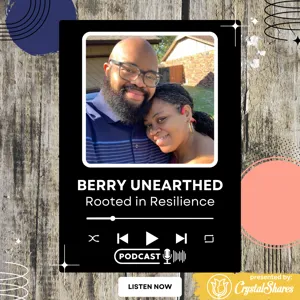Podcast Summary
The importance of continuing bonds and living with loss: Dr. Pauline Boss challenges the cultural norm of seeking closure and finding cures for emotional pain, instead emphasizing the importance of continuing bonds and living with loss and grief.
Learning from this discussion with Dr. Pauline Boss is that the desire for closure after a loss may not be beneficial for human relationships. Closure implies finality and the idea that once we've lost something or someone, we can close the door on that experience. However, according to Dr. Boss, this is not the case. Instead, she emphasizes the importance of continuing bonds and living with loss and grief. This perspective challenges the cultural norm of seeking closure and finding cures for our emotional pain. Dr. Boss's research on ambiguous loss, which she first introduced in the 1970s, has since expanded to include various personal, communal, and global losses, such as those related to the pandemic, racial trauma, and climate change. In her new book, "The Myth of Ambiguous Loss in a Time of Pandemic and Change," she further explores these topics and offers alternative ways to approach loss and resilience.
Understanding Ambiguous Loss in Families: Ambiguous loss, caused by a loved one's physical or psychological absence, freezes the grieving process and prevents progress. Desire for certainty about the loss is crucial for closure and healing.
Ambiguous loss, a concept coined in family therapy in the 1970s, refers to the stress and grief experienced when a loved one is missing, either physically or psychologically. This phenomenon was first observed in families where fathers were emotionally absent despite being physically present. The ambiguity surrounding the loss can freeze the grieving process and prevent decision-making and family progress. The desire for certainty about the loss is crucial, as it provides closure and allows the family system to move forward. The COVID-19 pandemic serves as an example of an ambiguous loss on a larger scale, with the virus's unpredictability and ongoing presence adding to the stress and uncertainty. Understanding ambiguous loss and its impact can help individuals and families navigate complex emotional landscapes and find ways to heal and grow.
Loss with no clear definition or resolution: Ambiguous loss, like that caused by war, dementia, work, devices, societal issues, or climate change, is distinct from quantifiable losses due to its lack of clear definition and resolution, leading to complex feelings of grief and loss.
Ambiguous loss refers to the experience of loss where there is no clear definition or resolution. This concept was first introduced in the context of families, particularly in relation to soldiers missing in war or caregivers dealing with loved ones with dementia. However, it can also apply to more common situations such as preoccupation with work or devices. More recently, the theory has been expanded to include societal losses, like those caused by the pandemic or racism. Ambiguous losses are distinct from quantifiable losses, such as the loss of money or property, because they lack clear definition and resolution. The speaker also proposed that climate change could lead to ambiguous losses through the loss of clean water, fertile lands, and way of life. The feelings of grief and loss associated with ambiguous losses can be compared to those experienced due to the pandemic, racism, or climate change. These losses are intangible and can be difficult to process, making it important for individuals and society to acknowledge and address them.
Losses from the pandemic are ambiguous and ongoing: Recognize and acknowledge ambiguous losses, allowing for natural processing of complex emotions
The pandemic has brought about ambiguous losses, which are different from traditional losses like death because they lack a clear end point. These losses, which include mental health issues and the upheaval of normal life, are real and significant, even if they're not quantifiable. Attachment theory suggests that even when a person or thing is gone, the attachment remains, leading to continuing bonds and normal grief. The speaker's personal experiences of loss, including the death of her brother and becoming a caretaker for her husband, have shaped her understanding of loss and the importance of recognizing and acknowledging it. The pressure to "get over it" is an artificial construct, and it's important to allow ourselves to experience and process the complex emotions that come with loss.
The grieving process is complex and doesn't follow a linear path towards closure.: Grief ebbs and flows over time, and there's no need to 'get over it'. Embrace the complexities of the grieving process.
It's important to understand that the grieving process doesn't follow a neat and linear path towards closure. As shared in the discussion, the speaker's personal experience of growing up in a community that encouraged remembrance, rather than urging to move on, influenced their perspective. This perspective is supported by modern research, which suggests that grief ebbs and flows over time, and there's no need to "get over it." Furthermore, historical figures like Freud, who publicly advocated for detachment, held different views in their personal letters. The pandemic, as a communal large-scale loss, has been a firsthand experience of existential threat for many younger Americans, and it's crucial to acknowledge and embrace the complexities of the grieving process. The speaker's decision to write the book more personally was an admirable attempt to align their professional and personal views.
The pandemic's impact on younger generations: The pandemic may lead young people to remember adversity and learn valuable coping skills, while also potentially shifting parenting styles towards allowing children to experience adversity.
The pandemic is shaping the way younger generations view risk, uncertainty, and loss, and this experience may lead to increased resilience and maturity. The speaker believes that young people will remember this period as a time of adversity, but also as a time when they learned valuable lessons about coping with difficult situations. The speaker also suggests that the pandemic may mark a shift away from overprotective parenting styles and towards allowing children to experience and learn from adversity. The speaker, who has spent her career studying loss and stress, identifies as an optimist and emphasizes the importance of resilience in the face of adversity.
Resilience: Adapting and Growing Stronger: Resilience is a mindset that helps us adapt to challenges, learn from hardships, and bounce back. Even in uncertain times, young people have shown remarkable resilience.
Resilience is a key factor in coping with life's challenges, especially during uncertain times like a pandemic. Some people may struggle with binary thinking, seeking clear-cut answers, but life is not binary, and resilience allows us to adapt and grow stronger. Young people, in particular, have shown remarkable maturity and creativity in dealing with the pandemic. Being resilient doesn't mean ignoring the hardships, but rather learning from them and bouncing back. It's a mindset that will help us navigate the inevitable losses and setbacks in life. So, even if the pandemic or other challenges knock us down, we can always get back up again.






